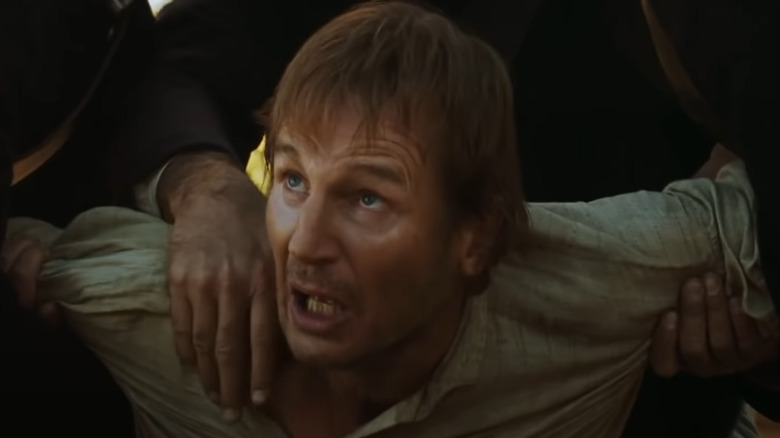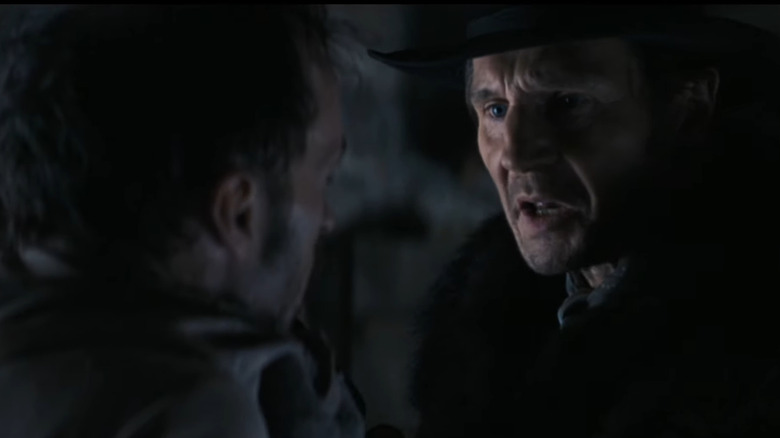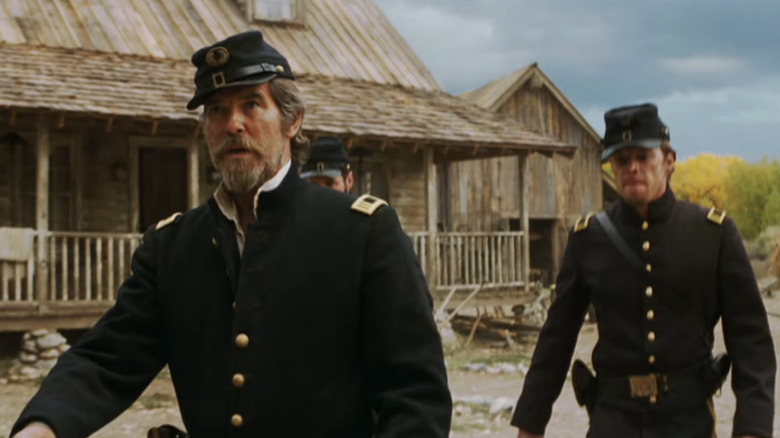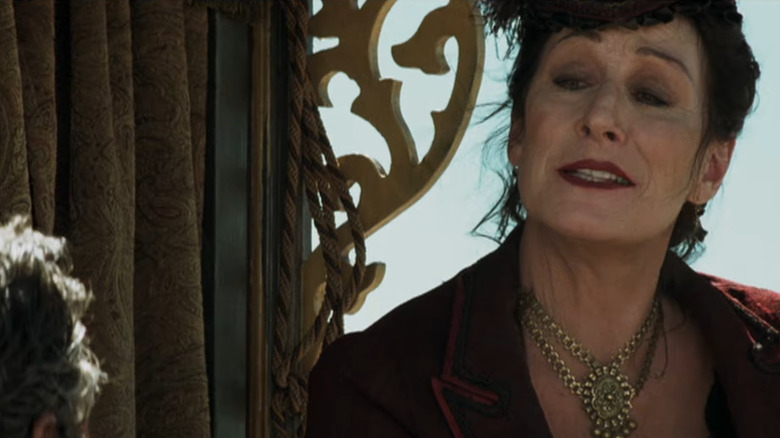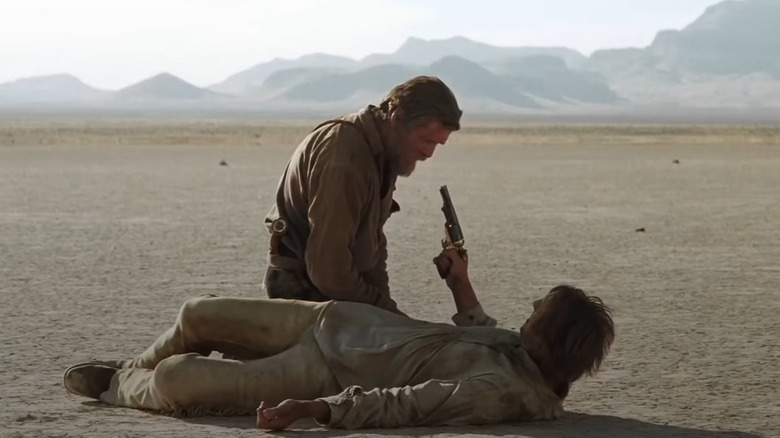The Ending Of Seraphim Falls Explained
The western genre is a surprisingly diverse one. From "Stagecoach" to "Rango," westerns can provide a style of storytelling that continues to evolve and diverge in unique and surprising directions. But at the end of the day, the best westerns can imbue meaningful themes and ideas into their deceptively simple premises in a manner that can reach a universal audience on multiple levels.
Such is the case for the 2007 film, "Seraphim Falls." The first and only film directed by the late television director David Von Ancken, the film, taking place some years after the Civil War, sees Liam Neeson and Pierce Brosnan star as sworn enemies Colonel Morsman Carver and Gideon, respectively. Carver and his men trek many miles to see off Gideon, with a mysterious and tragic event connecting the two. While "Seraphim Falls" saw a modest, limited release and garnered mixed reviews from critics, some found the film worthwhile. The Austin Chronicle offered some praise for "Falls" by calling it "Meditative, beautifully shot, and blessed with a healthy dose of cynicism."
Is there more to the gritty western than meets the eye, or is it as substantial as a tumbleweed? Saddle up as we examine the ideas explored in "Seraphim Falls" and what it means for its ending.
Who's more worth fearing?
As "Seraphim Falls" essentially works as a character study, it's crucial to understand how the film frames its two leads as it progresses. The film begins with Gideon already on the run from Colonel Carver and his band of bounty hunters. And Carver is not fooling around. Much of the film's first act sets him up as a threatening and imposing opponent. With his burly appearance and ruthless personality, Carver practically barrels through any obstacle thrown his way, perhaps best showcased when he and his men raid the home of a small family harboring Gideon.
However, while it's easy to root for Gideon at this point, the film makes it clear that he's no pushover. As a fur trapper, Gideon knows how to live off the land and fend for himself, which he more than proves as he goes against Carver's men. With his quick wit and ingenuity, Gideon can make surprisingly short work of almost anyone who goes after him. At the end of the day, both men are linked by their unending drive to keep fighting, no matter what. But who we root for to win that fight is thrown for a loop when their past is revealed.
Carver's tragic past reveals a challenging truth
For much of the film's first act, we get glimpses into the origin of Colonel Carver and Gideon's vicious rivalry. What we are primarily hinted at is that whatever fueled their feud began at the fictional Seraphim Falls.
It is later revealed that Seraphim Falls was the location of Carver's home, where he raised his family. Following the Civil War, Gideon, a Union General at the time, and his men trek out to find any remaining Confederate officers. After reaching Carver's home and learning that he is not there, Gideon's army burns it down to get Carver's wife, Rose (Angie Harmon), to confess where he is. However, things take an especially downward turn when it is discovered that their baby is still inside the burning house, unbeknownst to Gideon, who asked for a full search of the home beforehand. Both Rose and their son (Christopher Andrews) dash into the home to save the baby as Carver, held by Union officers, is forced to watch as they perish in flames.
The reveal resets the moral playing field that the film initially set up. While Gideon had no intention of killing Carver's family, he was still ultimately responsible for the event that led to their eventual fight. But if you think that was all the film had up its sleeves, think again.
What's really real?
Before the final confrontation occurs between Colonel Carver and Gideon, we are introduced to two characters whose place in the story is mysterious but nevertheless interesting. One after the other, both men come across a Native American man (Wesley Studi) sitting by a small water pool in the middle of the desert. In return for replenishment, the man takes one of Gideon's horses and Carver's remaining gold as payment.
While he is not named in the film, the character is listed in the credits as Charon, who, in traditional Greek mythology, is the ferryman for the Underworld who carries souls to the land of the dead. There is a problematic element to having a Native American playing a character surrounded in such an overtly spiritual light. Still, nevertheless, the character's role indicates just where our main characters are really heading.
Afterward, the two, exhausted in the desert, are each greeted by the mysterious Madame Louise (Anjelica Huston). The stagecoach rider also makes offers to the men, trading their remaining horses and water for weapons. Her role can also be seen in a less literal sense as a devil-type figure who only aims to fuel the fire that will keep their battle going on for all eternity. But is the fire strong enough to do so?
War solves nothing
The "Seraphim Falls" ending isn't as cut and dry as your typical Mexican standoff. The exhausted men finally catch up to each other in the middle of an expansive desert, with Gideon shooting Carver's side. When he reaches his fallen enemy, Gideon allows Carver the opportunity to shoot him instead rather than killing him then and there. Carver ultimately abandons the action as Gideon helps him to his feet. Slowly but surely, they drop their weapons, leaving them to the dust as they walk away. Both men take separate paths before they mysteriously disappear into the void.
The film's finale isn't interested in crafting a big, bloody battle. Along with using its empty environment to communicate another possible purgatory allegory, it also takes time to break down our characters and their rivalry. "Falls" uses its remaining few moments to both observe and comment on the very nature of the battle that has taken place. Their ultimate fate is not as important as the lessons they take away from it all.
No amount of pain or anguish can be fixed from their fight, with both only finding peace when they decide to let go of the conflict. As with so many other great westerns, the events in "Seraphim Falls" can convey rich, human themes about the futility of war and revenge and how it can ultimately lead to more damage than there was beforehand.
